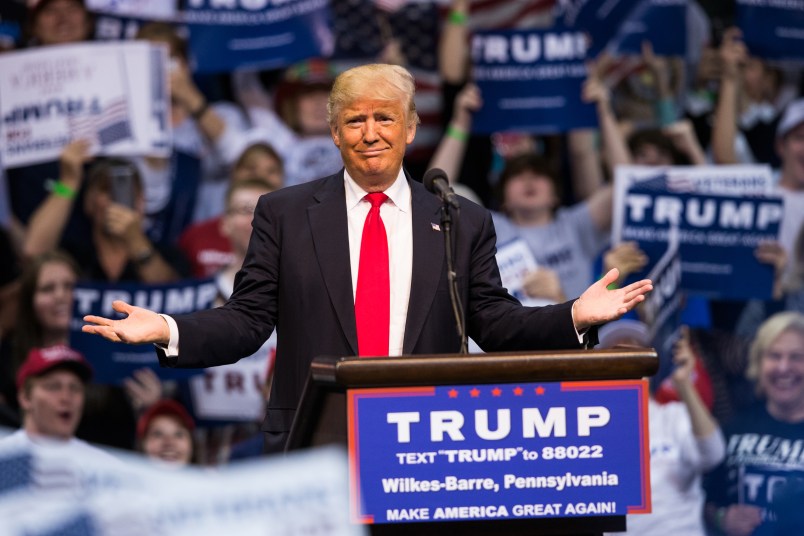Donald Trump’s proposed plans to cut taxes, engage in trade wars, and deport millions of undocumented immigrants would hurt the U.S. economy and send the country into a recession, according to new report by Moody’s Analytics.
Economists reviewed Trump’s proposed tax cuts for individuals and businesses, his calls to deport undocumented immigrants and build a southern border wall, and his threats to impose large tariffs on goods imported from China and Mexico.
The analysis found that if all of Trump’s proposals were implemented, “the economy suffers a lengthy recession and is smaller at the end of his four-year term than when he took office.”
“The upshot of Mr. Trump’s economic policy positions under almost any scenario is that the U.S. economy will be more isolated and diminished,” the report reads.
The economists drew four basic conclusions about the impact of Trump’s plans: a less global economy, larger government debt, a weaker economy with higher unemployment, and benefits mostly for high-income Americans.
Trump has proposed significant tax cuts without proposing spending cuts to offset the reduced revenue, which the Moody’s report found would cause interest rates to rise and weaken the economy. The analysis also found that high-income households would benefit most from Trump’s economic plan.
“Everyone receives a tax cut under his proposals, but the bulk of the cuts would go to those at the very top of the income distribution, and the job losses resulting from his other policies would likely hit lower- and middle-income households the hardest,” the report reads.
The presumptive Republican presidential nominee’s immigration and trade proposals would result in “a smaller economy and higher inflation,” according to the report.
“Broadly, Mr. Trump’s economic proposals will result in a more isolated economy. Cross-border trade and immigration will be significantly diminished, with less trade and immigration, foreign direct investment will also be reduced,” the report reads. “While globalization has created winners and losers in the U.S. economy in recent decades, it contributes substantially to the ongoing growth of the U.S. economy. Pulling back from globalization, as Mr. Trump is proposing, will thus diminish the nation’s growth prospects.”
The economists argue that employers, such as farms, who lose immigrant employees would likely struggle to fill those spots with American workers, which will cause labor costs to go up for those positions. This could also prompt the cost of products to increase.
An increase in tariffs would contribute to inflation, cause the price of imports to increase, and to boot, China and Mexico could retaliate with tariffs on U.S. exports, according to Moody’s.
The report also looked at scenarios in which Trump’s plans are not implemented to the fullest extent, potentially because he is hamstrung by Congress, in which case Trump’s policy proposals would have a less negative impact on the economy.
Moody’s Analytics used a model similar to that used by the Congressional Budget Office in analyzing the federal budget’s impact.
The Moody’s analysis was first reported by the Wall Street Journal, which noted that the Moody’s report “singles out trade and immigration policies as the most detrimental to the economy in the short run.”
An unnamed adviser to the Trump campaign defended the real estate mogul’s proposals to the Wall Street Journal and said that Trump will provide more details on his economic plans soon. From the Wall Street Journal:
A person close to the Trump campaign said such analyses rested on flawed assumptions about policies that haven’t been fully fleshed out by the campaign.
Moreover, the adviser said Mr. Trump’s tax-cut and deregulation proposals would instead provide the economy with greater stimulus at a time when a slowdown in business investment and industrial production has raised concerns that the economy could slide into recession in the next year.







Moody’s rallies aren’t nearly as big as Trump’s. Their analysis must be mistaken.
I had one of those loser Moody rings, it never worked. Sad!
Moody’s is a failing enterprise. No one reads their reports. They’re terrible. Losers. Sad.
He"s just lucky they didn’t do an analysis of his personal finances instead.
The barons demand certainty — Imagine …
We get close to Nov… $$$ is withdrawn from markets in search of “safe havens” —
A financial panic could happen well before a Dumpster was anywhere near the oval —